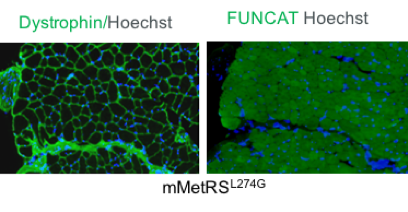In an effort to identify the proteins that are capable of attenuating and reversing tissue aging (objectively and directly from freshly isolated tissue samples), we developed a method where the proteome of only one parabiont is selectively labeled utilizing bio-orthogonal non-canonical amino acid tagging (BONCAT) for subsequent identification in the tissues of the parabiotic partner.

BONCAT is a powerful tool to metabolically label proteins during their de-novo synthesis by selectively incorporating the methionine substitute azido-nor-leucine (ANL) in cells expressing a mutant methionyl-tRNA synthetase (MetRS, the mutation is L274G in mice). This labeling method was successfully used in our recently published study to exclusively tag the proteome of the young transgenic MetRSL274G mice that have been joined with old C57BL/6 partners in heterochronic parabiosis. This enabled the detection of several young proteins – rejuvenating candidates that were transferred to the old mammalian tissue via the shared circulation.

Dr. Yan Liu (Conboy lab → Associate Professor 7th Affiliated Hospital, Shenzen China)
Current focus is on novel downstream of BONCAT technology, enabling Identification of the key changes in mammalian proteome that underlie the switch from healthy homeostasis to multi-tissue pathologies, revolutionizing diagnostics, prevention and therapeutics for a number of degenerative and metabolic diseases.